[ad_1]
You want to go camping in the woods, but your only equipment is a beach tent. Instead of buying a new tent, you might wonder whether a beach tent is as good as a camping tent for this purpose. Can you get away without buying a new tent to help keep you as comfortable as possible on your next camping trip?
Beach tents are not typically good for camping. They are less spacious and offer little to no protection from the elements if it should rain, snow, or have heavy winds. Beach tents also offer little to no privacy and are less durable than camping tents. Still, they do offer great UV protection.
If you’re considering what tent to use on your next camping trip, here’s what you need to know.
Can You Use a Beach Tent for Regular Camping?
Many people have a limited budget for their camping equipment, so they may want to purchase one tent that they can use for all purposes.
If you live in a tropical locale, you might be wondering whether the beach tent you bought can also be used for regular camping.
Unfortunately, you might want to rethink using a beach tent for your standard camping trip in the woods. They’re not designed for this purpose and lack some features you likely want while camping.
Here are a few reasons why a beach tent might not be good for camping.
1. Lack of Room
For the most part, your beach tent is designed to keep you sheltered from the sun. Many avid campers don’t use a real tent while camping on the beach.
Instead, they opt for a pop-up tent or some kind of canopy. As a result, you may not have as much space on the interior of your beach tent.
When camping the traditional way, you want to consider packing your gear in the tent with you at night.
A regular tent has more space to accommodate your sleeping pad, sleeping bag, a bag of gear, and more. If you want space to move around in your tent, you’ll likely want to spring for a camping tent.
That being said, some beach tents do have plenty of space inside. If you think you may want to use the tent for dual purposes, look for beach tents with interior space.
2. No Protection from the Elements
Imagine spending an afternoon on the sand of your favorite local beach. The breeze is blowing in off the ocean, and you can feel it cool you down almost instantly.
Beach tents are designed with this in mind: allowing the breeze to pass through. They have thin walls and good ventilation, so you don’t have to feel overwhelmingly hot on those sticky sun-drenched afternoons.
Of course, this can be bad if you aren’t at the beach and encounter some bad weather.
A beach tent isn’t likely to be waterproof. When sudden storms approach, you’ll be wet faster than you imagine if you’re in a beach tent. They also don’t hold up as well under extra windy weather.
When you think you may encounter inclement weather, do yourself a favor and get a more traditional tent.
3. No Privacy
Are you camping with a group of friends and just want a little space to yourself occasionally? With a beach tent, you aren’t likely to find much privacy.
The walls are thin, and most people can hear and see you. This makes it difficult to change clothes or just to relax without the prying eyes of your friends and family.
A regular tent typically has thicker walls that are less see-through.
You’ll be happy to know you can change your clothes efficiently when you don’t use a beach tent – and your friends don’t have to avert their eyes!
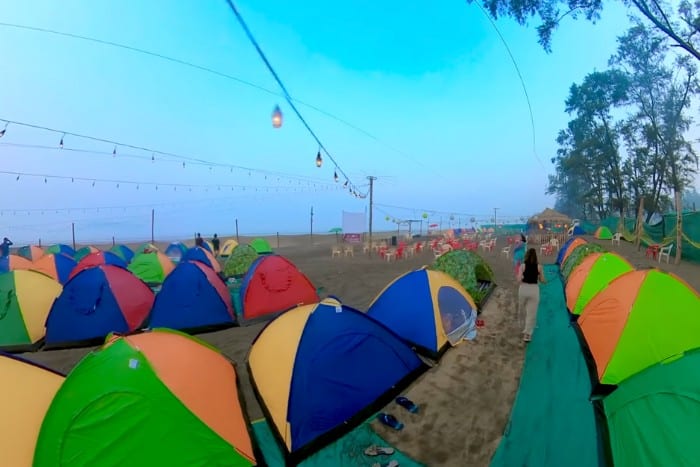
4. Fewer Options
Beach tents come in just a few standard shapes and sizes. You aren’t likely to find too many types of beach tents, though there are plenty of name brands on the market.
They’ll most frequently be pop-up tents or canopies. You may also find some very small tents that offer full protection, but this might not be exactly what you’re looking for.
Traditional tents have a much greater scope of styles and varieties that you can purchase. Budget will often dictate what you can afford, but indulging in a nice tent makes sense.
A tent is easily the most important aspect of your camping gear since it protects you and your gear.
Opting for a standard tent over a beach tent means you might find much larger tents, including those with separate rooms for privacy during the trip.
You may find tents with a vestibule, which is great for storing your gear overnight. Windows are also a great feature to let the breeze blow through, similar to a beach tent.
5. Less Durability
Your beach tent likely isn’t made to the same standards as a traditional camping tent. They aren’t designed for routine use and won’t withstand abuse.
Campers who turn to a beach tent are less likely to spend their trip inside the tent, opting for the sand and sea. As a result, you may find that these tents won’t hold up to the rigors of camping.
It’s best not to max out what your beach tent can protect you from. The fabric may not hold up well over rocky terrain or with sticks underneath it.
It’s made to have a bed of sand beneath it, something soft and pliable. Don’t try to get your beach tent to withstand the stress of a traditional campsite in the woods.
Using a camping tent designed specifically for this purpose makes more sense. Remember that the stakes used with a beach tent will also likely differ.
More traditional stakes must replace sand stakes if you aim to take your beach tent camping.
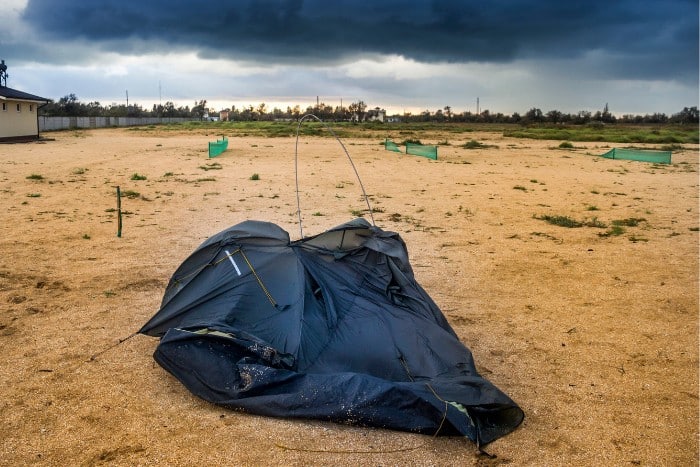
6. UV Resistance
For many campers, spending all day in the sun on the beach is a dream come true. However, they often want a break from the sun when they feel that their skin is starting to turn a little pink.
A beach tent offers UV protection to minimize sunburn and get a break from the sun. On the other hand, most camping tents don’t have this same feature.
If you are somewhere very sunny, you may want to consider using a beach tent.
This is the one circumstance when a beach tent could be the better option even though it lacks space and protection from the weather.
If you still want to go ahead and buy a dedicated beach tent, I have a few good recommendations in my article on the best tents for camping on the beach.
Final Thoughts
On almost every level, a camping tent is superior to a beach tent when taking a more traditional camping trip. They’re more durable, spacious, and private, with more options to meet your needs.
The only downside is that they will likely lack UV protection from the sun. Consider whether you should invest in a beach tent or a camping tent before your next excursion!
Source link

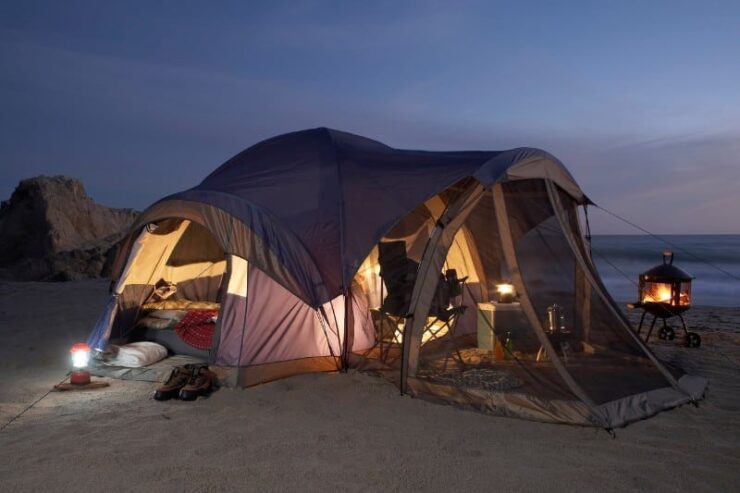

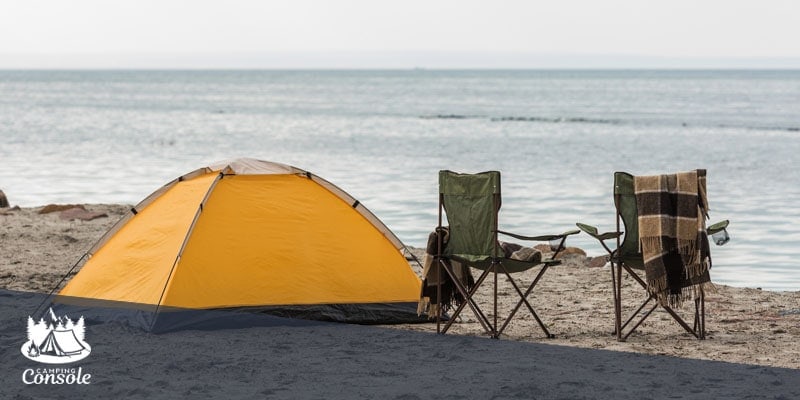
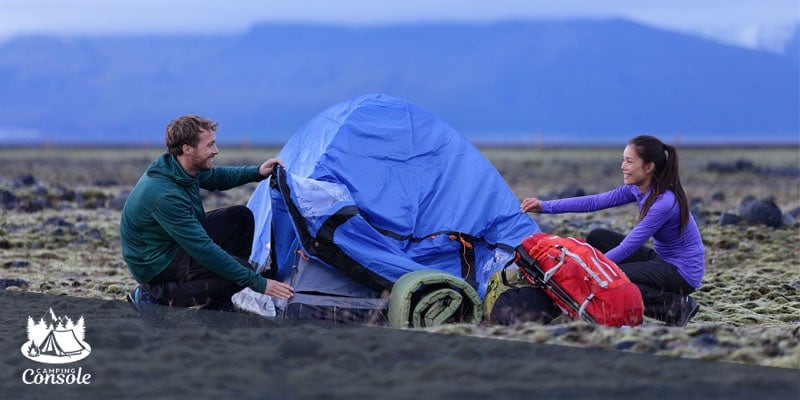
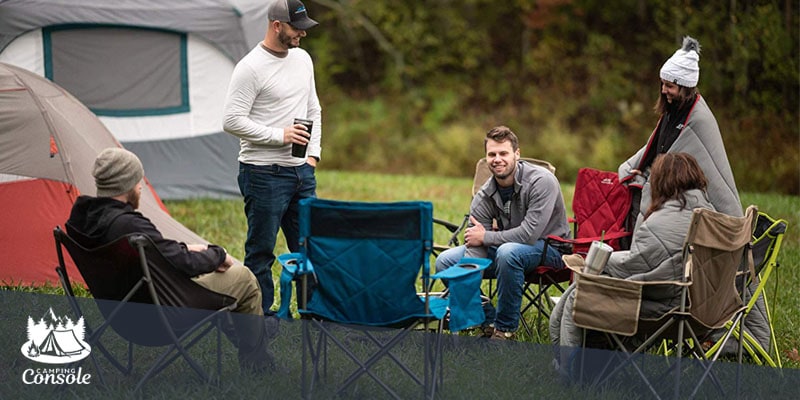
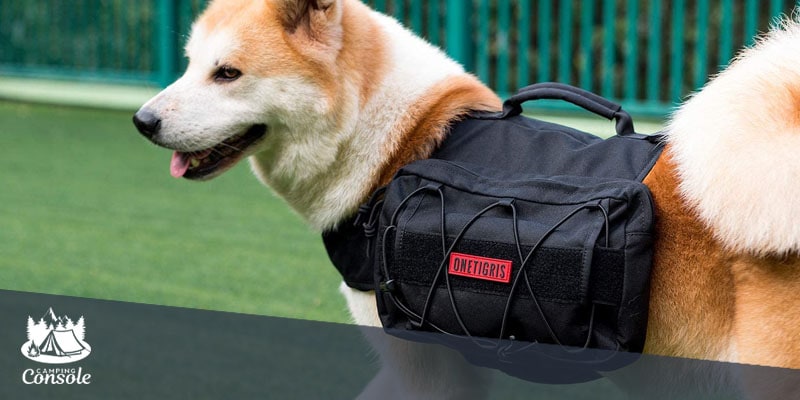


Add comment